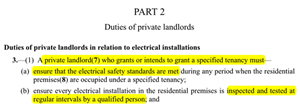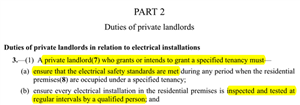If you pass the City and Guilds exam, you are awarded a certificate titled "BS7671 Requirements for Electrical Installations" The term "Wiring Regulations" is not on the sheet.
However, I note that most job requirements ask for 2391/2396/18th Wiring Regulations. Virtually no one talks in the context of " BS7671"
I am wondering if members can give me an idea how the two terms are related, who makes the decisions on "regulations" and who is accountable for those decisions. I have noted errors/confusion on various posts these last few days caused by ambiguity in those regulations and it seems the person who should be protected by these regulations (the customer) is the last to be considered.
Ever the cynic, is the term "wiring regulations" retained for sentimental reasons or just to sell the book?
Thanks in advance.
Regards, UKPN




